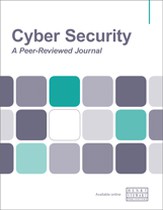Examining generational impacts of machine learning, artificial intelligence, generative AI and deepfake-based social engineering cybercrime
Abstract
Social engineering (SE) has been used as an effective technique for decades to extract information from individuals for malicious purposes. Machine learning (ML), artificial intelligence (AI), generative AI (GenAI) and deepfakes provide advanced technologies and tools for cybercriminals to increase the probability of a successful cyberattack. Our ability to detect that we are being maliciously manipulated is becoming increasingly difficult as these technologies are incorporated into SE-based cyberattacks. This paper examines the positive and negative aspects of ML, AI and GenAI, reviews existing literature about these technologies and presents a brief introduction of the technical aspects of ML, AI and deepfakes. The decision model Required Elements for a Social Engineered Cyber Attack Theory examines our decision processes when confronted by a SE-based cyberattack, and how simple decisions can become more complicated when influenced by AI. Examples of generation-specific AI-based scams are examined to describe techniques bad actors are using to victimise specific age groups. The conclusion offers recommendations that technology users can adopt to reduce their exposure of being victimised by AI-based SE cyberattacks.
The full article is available to subscribers to the journal.
Author's Biography
Christopher S. Kayser Chris Kayser is Founder, President and Chief Executive Officer of Cybercrime Analytics Inc., Calgary, Alberta, and holds a Masters of Criminal Justice with a Subconcentration in Cybercrime Investigation and Cybersecurity (Boston University). He has held a Chartered Market Technicians (CMT) designation since 2008. He is on the Advisory Board for the Center for Cybercrime Investigation & Cybersecurity, editorial review board member and Production Manager of the International Journal of Cybersecurity Intelligence & Cybercrime, Cyber Advisory Board member — University of Scranton, Community of Interest member with CyberAlberta, and editorial reviewer for the CMT’s Journal of Technical Analysis. His memberships include American Society of Criminology (ASC), Academy of Criminal Justice Sciences (ACJS) and Canada’s eCrime Cyber Council. Chris has authored two books: Cybercrime through Social Engineering – The New Global Crisis and How to Master an Online Degree – A Guide to Success. He engages in consulting, education, presentations, research, cyber-related expert witness testimony and other cyber-related issues, particularly in aspects related to social engineering.
